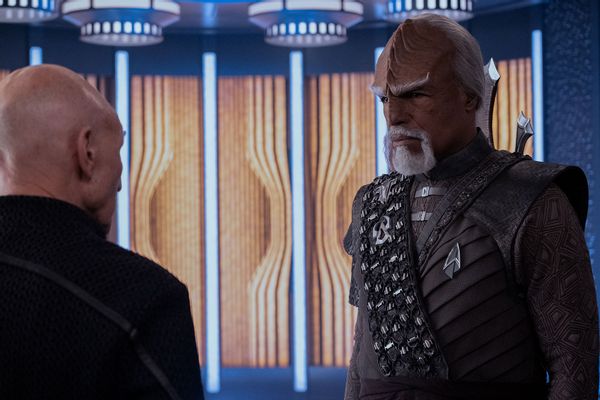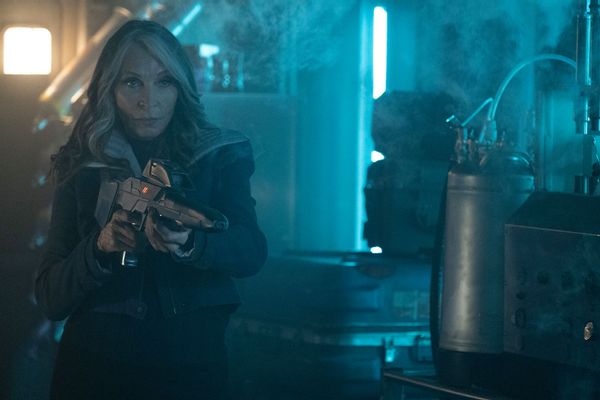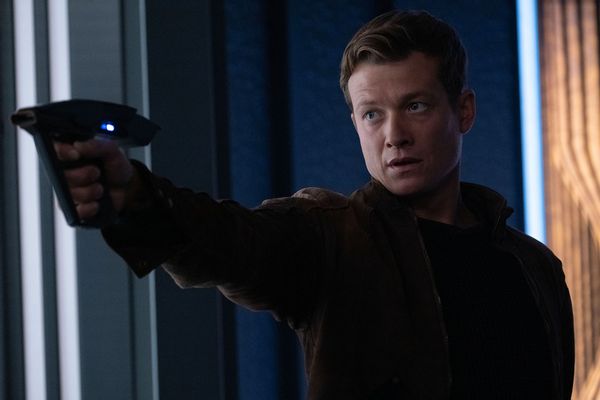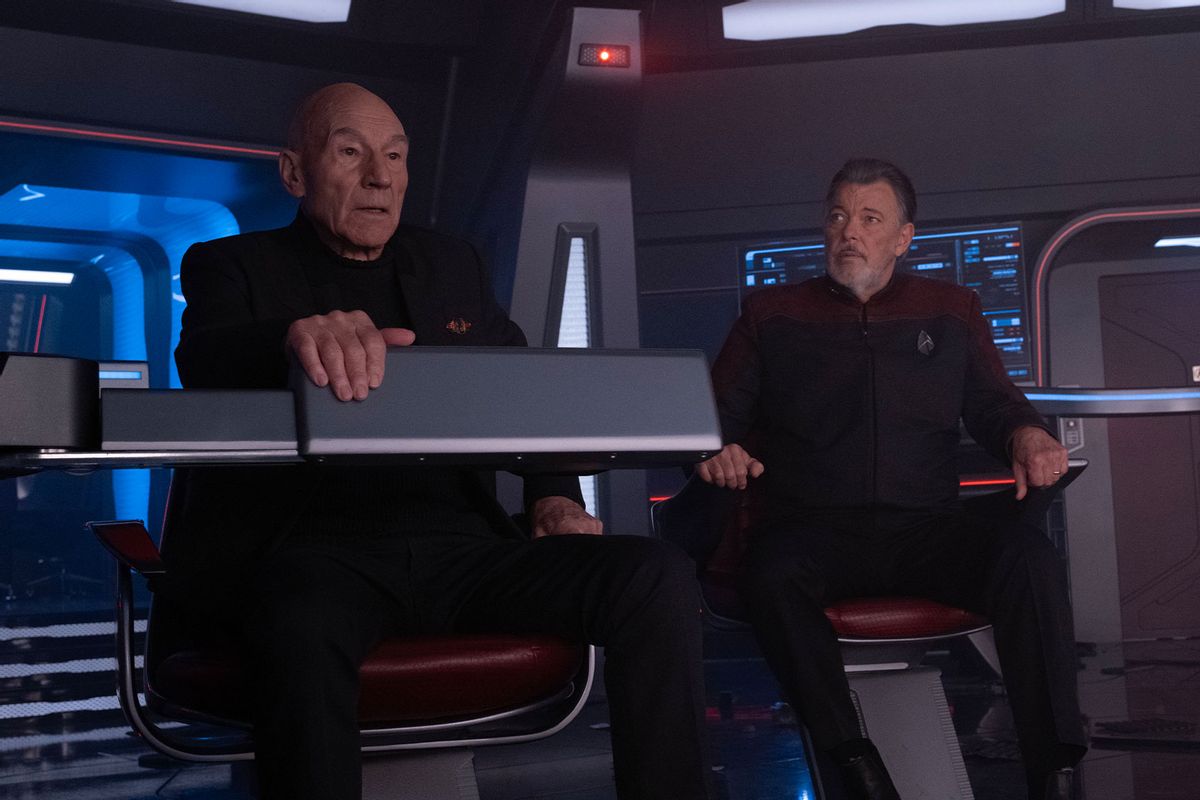Fanaticism is boring. That's true of religion and genre franchise entertainment, and often the twain meets within the fandoms of heritage brands like "Star Wars," the Tolkien universe, and, yes, "Star Trek."
To travel the Trek universe(s) means encountering many tests of legitimacy gauged by any number of determining factors. Were you a fan of the original? Who is the best captain? What are your feelings about J.J. Abrams' Kelvin Timeline? (There is a wrong answer, in case you're wondering.)
According to the devoted, woe to those who deigned to enjoy any aspects of "Star Trek: Discovery" and previous seasons of "Star Trek: Picard." Only "Star Trek: Lower Decks" and "Star Trek: Strange New Worlds" are deemed as acceptable newcomers because they utilize the same quandary-of-the-week format that defined the original "Star Trek."
"Discovery" supposedly fails Gene Roddenberry's original directive by being too dark, aggressive and grim; "Picard," in its first season, introduces a space elf reminiscent of "Lord of the Rings" hottie Legolas. Each deserves credit for testing the boundaries of what we expect of Starfleet and the characters who define its ideals but to the truest of true believers, those are not truly "Star Trek." They are violations. Into the airlock with you!
This brings us to Worf (Michael Dorn) and his reintroduction to the franchise in the second episode of this third and final season of "Picard." The Klingon officer was part of Jean-Luc Picard's (Patrick Stewart) crew on the USS Enterprise on "Star Trek: The Next Generation" before transferring to work under the command of Benjamin Sisko on "Star Trek: Deep Space Nine."
He's served in many capacities and constructed a rich legend throughout his time on these series and the "TNG"-related movies, which made his resurfacing in "Picard" as a one-man, bat'leth-swinging killing machine . . . divisive.
 Michael Dorn as Worf in "Star Trek: Picard" (Trae Patton/Paramount+)
Michael Dorn as Worf in "Star Trek: Picard" (Trae Patton/Paramount+)
This is a simplistic reduction of what occurred. Worf co-stars in a parallel plot with Starfleet intelligence agent Raffi Musiker (Michelle Hurd), whose deep cover efforts failed to stop a deadly terrorist attack on a Starfleet recruitment center. In her anger, and against the orders of her unseen handler, she clumsily tries to shake down a Ferengi gangster only to have him order his goons to slaughter her.
Their hands never make it to their holsters. The last thing a drugged Raffi sees before she passes out is what appears to be a humanoid Cuisinart making swift work of her would-be killers, but the audience witnesses the full coup de grace in which her savior, Worf, beheads said Ferengi crime lord, who was unarmed.
How is that honorable? Worf would never do that. Putting aside the circumstances, in which the guy had just ordered a Starfleet agent's death after showing off the severed head of another figure, one might ask a very obvious question: How can you be so sure?
When a character asks, "Is there anybody you know who's still the person you knew?" he might as well be posing that to doubting viewers.
Twenty years have passed since audiences last saw Lieutenant Commander Worf in action, in "Star Trek: Nemesis." Within that same period, Picard's Number One, Commander William Riker (Jonathan Frakes) became captain of the USS Titan and settled down with Deanna Troi (Marina Sirtis) only to encounter a rocky patch in their marriage. Data (Brent Spiner) found a way to have twin daughters. The heretofore gentle Dr. Beverly Crusher (Gates McFadden) became a gun-toting smuggler.
 Gates McFadden as Dr. Beverly Crusher in "Star Trek: Picard" (Trae Patton/Paramount+)
Gates McFadden as Dr. Beverly Crusher in "Star Trek: Picard" (Trae Patton/Paramount+)
When a character points out how long it's been since Picard has caught up with most of his old friends, and asks, "Is there anybody you know who's still the person you knew?" he might as well be posing that to doubting viewers. Of course, Picard has already grappled with that question in witnessing the progression of Seven of Nine (Jeri Ryan) from Borg to Starfleet crewmember to space pirate and back again. When she greets him this time, she's the Titan's second-in-command. Unfortunately, the ship's abrasive Captain Liam Shaw (Todd Stashwick) lacks the humor and forbearance of Picard or Riker. We also receive some hints that he wasn't always this prickly, either.
This is one of the broader points "Picard" makes throughout its farewell episodes, six of which were provided for review. Everything and everyone changes, Worf included. He's always taken pride in his Klingon warrior heritage while building his near-perfect Starfleet record, eventually winning enough trust among his Federation and Klingon peers to become an ambassador.
Dorn pointed out in a recently held Television Critics Association press conference that Worf is on a lifelong journey to figure out who he is. The meeting place of his various identities might look something like, say, a silver-haired martial arts master practicing his forms to a selection from Hector Berlioz's opera "Les Troyens."
In a measure of validation for the doubters, Dorn admitted to having a few reservations about Worf's initial reveal in "Picard," but was ultimately satisfied by how his story progressed. Nevertheless: "There were times when I'd look at the script and go, 'You know, Worf wouldn't say that. You know?'" Dorn told reporters covering the event. "And Jonathan Frakes, you know, he would say, 'Shut up, Mike, and do the lines.'"
That may be, but Worf's way of introducing himself to Raffi in the third episode is flawlessly in character. "I am Worf, son of Mogh. House of Martok. Son of Sergey, House of Rozhenko. Bane to the Duras family. Slayer of Gowron. I have made some chamomile tea. Do you take sugar?"
Picard is not even his old self on a cellular level. Yet he is still very much the Jean-Luc fans venerate.
"Picard" never attempted to be an extension of "The Next Generation" in format or style, eschewing its predecessor's weekly adventure format in favor of a serialized plot. Season 1 is a mystery reentering the life of the show's namesake at a point of his extreme disillusionment with the United Federation of Planets, and its emphasis on politics over the sanctity of all life. He proved his willingness to die in defense of that principle in that season's finale, which most might agree is a very Admiral Picard move.
Leap ahead to the current "Picard" episodes (and we mean that, you can skip the second season and not miss a thing) and Picard is not even his old self on a cellular level. His consciousness was loaded into a synthetic replication of his body at the end of Season 1 when it looked as if an inoperable brain abnormality was going to finish him off.
 Ed Speelers as Jack in "Disengage" in "Star Trek: Picard" (Trae Patton/Paramount+)
Ed Speelers as Jack in "Disengage" in "Star Trek: Picard" (Trae Patton/Paramount+)
Yet he is still very much the Jean-Luc fans venerate. That makes the current season's auxiliary theme provocative on a deeper level that it initially seems. "I am not a man who needs a legacy," Picard magnanimously declares to his doting Romulan housekeeper Laris (Orla Brady) as the premiere starts.
In the grand plan of it all our desires don't matter, which the writers prove by the end of the second episode when Picard is make to realize that Beverly's son, Jack (Ed Speleers), is also his kid, raised without his knowledge on the extralegal side of the galaxy.
Want a daily wrap-up of all the news and commentary Salon has to offer? Subscribe to our morning newsletter, Crash Course.
Why Beverly cut off Jean-Luc and everyone else in this otherwise tight crew is eventually explained, and in doing so the writers invite anyone who places Picard on a pedestal to reexamine that unquestioning regard. At the end of it all, Picard is an institution too. And if the Federation and Starfleet were at times blinded by their dedication to principles over humanity, so was the man said to represent the best of what they stood for.
"Picard," as previously mentioned, bellyflopped in its second season but it did so by trying something new within a familiar universe. Many of the claims about the new interpretations of the franchise return to the familiar claim of something "not being 'Star Trek'," which is the same projectile that was hurled at "The Next Generation" by those who would accept no other captain than James T. Kirk and toward "Deep Space Nine" for daring to de-emphasize one-and-done plots for season-long arcs.
Some refused to accept Zachary Quinto as Spock, or moaned about the franchise's insistence on recycling Spock through the franchise only to be delighted by Ethan Peck's jaunty take on the iconic Vulcan in "Strange New Worlds."
"The Next Generation" crew never received a farewell commensurate to the esteem in which Trekkers hold them, and the last season of "Picard" strives to do that not by returning to the explorers they once were but wiser, more scarred, and battle-hardened.
It is not like "Star Trek: The Next Generation," in the sense that it mimics a conspiracy thriller as opposed to a philosophically driven space odyssey. But it is "Star Trek," and a fitting closer for a team that spent seven seasons between 1987 and 1994 reminding viewers that what makes us extraordinary is our adventurous nature.



Shares